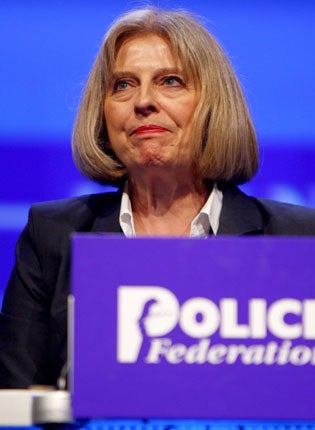Cabinet split on Islamic extremist crackdown

Your support helps us to tell the story
From reproductive rights to climate change to Big Tech, The Independent is on the ground when the story is developing. Whether it's investigating the financials of Elon Musk's pro-Trump PAC or producing our latest documentary, 'The A Word', which shines a light on the American women fighting for reproductive rights, we know how important it is to parse out the facts from the messaging.
At such a critical moment in US history, we need reporters on the ground. Your donation allows us to keep sending journalists to speak to both sides of the story.
The Independent is trusted by Americans across the entire political spectrum. And unlike many other quality news outlets, we choose not to lock Americans out of our reporting and analysis with paywalls. We believe quality journalism should be available to everyone, paid for by those who can afford it.
Your support makes all the difference.A crackdown on Islamist extremists, centring on a ban on hardline groups at universities, is set to be approved this week by David Cameron.
The so-called Prevent strategy, designed to counter the radicalisation of teenagers and young adults, will be overhauled to encompass a wider range of groups than under the last Government and to ensure those receiving public money "reflect mainstream British values".
The moves come amid tensions within the Coalition on the best approach to groups that are non-violent but advocate extreme positions, such as support for sharia.
Liberal Democrat ministers tend to echo the view of their Labour predecessors that it is better to engage with such groups than to marginalise them. They have been backed by Charles Farr, the head of the office of security and counter-terrorism. But Mr Cameron and Tory ministers believe that certain groups hold views so inimical to western liberal values that they cannot be drawn into debate.
In opposition, Mr Cameron pledged to outlaw groups such as Hizb ut-Tahrir. But he has yet to turn the promise into action and the strategy is not expected to include a ban on the organisation. It will focus on extremists attempting to win recruits among students and holding meetings on campuses, taking a broader view over which groups should be banned from universities and colleges. The strategy will also place tight restrictions on which organisations can qualify for public money, with applicants told to prove they do not champion hardline views and warned funding will be immediately withdrawn if they stray into extremism.
Publication of the strategy has been delayed for five months, amid protracted wrangling between the coalition partners, between Tory members of the Cabinet and between ministers and civil servants. Theresa May, the Home Secretary, and Michael Gove, the Education Secretary, reportedly clashed over its contents. Mr Gove is said to have complained that it did not take tough action against campus radicalisation – and to have successfully argued for those measures to be toughened up.
The strategy's details are set to be finalised within the next 48 hours, following meetings in Downing Street. It is due to be set out by Theresa May in a Commons statement within the next fortnight.
Mr Cameron, who returns to his London desk this week after a break in Ibiza, gave a clear indication of the direction of his thinking in a speech in Munich in February.
Placing advocacy of extreme ideologies alongside support for terrorism in a sliding-scale of views, he said: "Move along the spectrum, and you find people who may reject violence, but who accept various parts of the extremist world view, including real hostility towards Western democracy and liberal values." During the Munich speech, he said it was "nonsense" to fund extremist organisations, adding: "Would you allow far-right groups a share of public funds if they promise to help you lure young white men away from fascist terrorism? Of course not."
On the same day, Nick Clegg delivered a very different message in Luton, which has been linked with Islamist hardline groups.
He argued that it was important to maintain the distinction between violent and non-violent extremism. The Deputy Prime Minister has received unlikely backing from two senior Conservative ministers, Baroness Warsi and Dominic Grieve, the Attorney-General.
Join our commenting forum
Join thought-provoking conversations, follow other Independent readers and see their replies
Comments